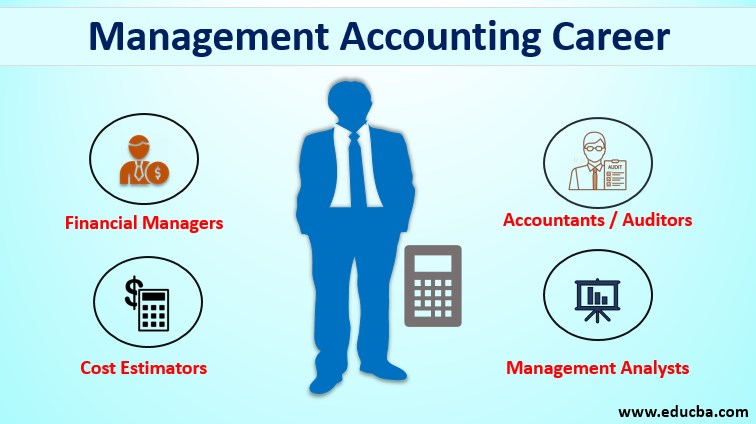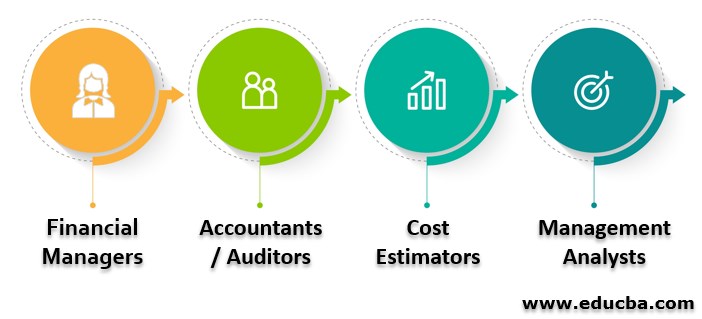Updated July 21, 2023
Definition of Management Accounting Career
A career in management accounting primarily requires you to handle the financial and accounting aspects of an organization. Management accounting is also known as Corporate accounting or Managerial accounting. In this domain, you will work within organizations and manage their internal financial processes, such as examining costs, monitoring sales, and conducting audits.
As a prospective candidate willing to enter the managerial accounting field, you should be skilled in strategic planning, budget planning, and financial data analysis. Further, you will also be expected to have a good understanding of generally accepted accounting principles (GAAP) and strong communication skills.
A Career in Management Accounting
In this article, we will discuss some of the major management accounting profiles from which you can choose based on your interest, educational background, and expected compensation.
1. Financial Managers
As a financial manager, you will be assigned the task of managing the financial health of an organization. You will be preparing financial reports, driving investment activities, and developing long-term strategies for achieving the organization’s financial goals.
Responsibilities
Some of the major responsibilities of financial managers are:
- Preparation of financial statements and business activity reports
- Keeping track of financials and ensure compliance to applicable legal requirements
- Overseeing staffs who prepare financial reports and budgets
- Evaluation of the company’s financials to explore ways to reduce costs
- Evaluation of market developments seeking opportunities to boost profitability
- Guiding management in making investment decisions
Educational Requirement
In order to become a financial manager, you will need to have a bachelor’s degree in finance, economics, accounting or business administration. In fact, some of the employers prefer candidates with a master’s degree in the field of finance, business administration, economics, or accounting. Further, some of the good to have certifications include Chartered Financial Analyst (CFA), Certified Treasury Professional (CTP), and Certified Public Accountants (CPA).
Salary
The median salary for financial managers is around $127,990 with the bottom 10% earning $67,620 or less and the top 10% earning in excess of $208,000.
Source Link: https://www.bls.gov/ooh/management/financial-managers.htm#tab-5
Job Outlook
In the US, the number of employment opportunities for financial managers is projected to grow at a CAGR of 1.50% from 653,600 in 2018 to 758,300 in 2028.
Source Link: https://www.bls.gov/ooh/management/financial-managers.htm#tab-6
2. Accountants / Auditors
As an accountant or auditor, you will responsible for preparing and examining financial records. You will assess the financial operations to maintain organizational efficiency and also ensure that the financials are being reported accurately.
Responsibilities
Some of the major responsibilities of accountants/auditors are:
- Ensure accuracy of financial reporting alongside compliance to applicable laws and regulations.
- Computation of tax liabilities, filing of tax returns and other tax-related activities.
- Examining accounting books and ensure the use of acceptable accounting system.
- Evaluation of financial operations and recommend operational improvements.
- Advising means of reducing costs, increasing revenues, and maximizing profits.
Educational Requirement
In order to become an accountant or auditor, you will need to have a bachelor’s degree in accounting or a related field. Additionally, having certifications like CPA can further enhance your job prospects.
Salary
The median salary for accountants and auditors is around $70,500 with the bottom 10% earning $43,650 or less and the top 10% earning in excess of $122,840.
Source Link: https://www.bls.gov/ooh/business-and-financial/accountants-and-auditors.htm#tab-5
Job Outlook
In the US, the number of employment opportunities for accountants and auditors is projected to grow at a CAGR of 0.62% from 1,424,000 in 2018 to 1,514,700 in 2028.
Source Link: https://www.bls.gov/ooh/business-and-financial/accountants-and-auditors.htm#tab-6
3. Cost Estimators
As a cost estimator, your primary task will be the collection and analysis of data to draw insights to measure how much time, material, labor, and ultimately money will be required for the manufacturing process.
Responsibilities
Some of the major responsibilities of cost estimators are:
- Identification of factors that largely affect the overall cost
- Collaboration with the technical team (including engineers, architects, and contractors) for preparing estimates
- Continuously monitor and analyze estimates to recommend ways of reducing costs
- Collaboration with sales team for preparing client bids
- Maintenance of all cost-related records (both estimated and actual)
Educational Requirement
In order to become a cost estimator, you will need to have a bachelor’s degree in business or finance. Even candidates with engineering backgrounds are also preferred.
Salary
The median salary for cost estimators is around $64,040 with the bottom 10% earning $38,060 or less and the top 10% earning in excess of $107,940.
Source Link: https://www.bls.gov/ooh/business-and-financial/cost-estimators.htm#tab-5
Job Outlook
In the US, the number of employment opportunities for cost estimators is projected to grow at a CAGR of 0.83% from 217,400 in 2018 to 236,100 in 2028.
Source Link: https://www.bls.gov/ooh/business-and-financial/cost-estimators.htm#tab-6
4. Management Analysts
As a management analyst, you will be required to advise the organization on ways to improving its efficiency which will eventually result in higher profitability.
Responsibilities
Some of the major responsibilities of management analysts are:
- Identifying the process that can be further improved
- Gathering resources and personnel will be required for the improvement projects
- Analyzing financial and operational data with the intent to develop solutions
- Preparation of reports with recommendations for new systems and procedures
- Discussion with management for smooth implementation of the recommended changes
Educational Requirement
In order to become a management analyst, you will need at least a bachelor’s degree, while some of the employers prefer candidates with a master’s degree in business administration. Certain certifications like Certified Management Consultant (CMC) can further enhance your chances of getting hired.
Salary
The median salary for management analysts is around $83,610 with the bottom 10% earning $48,360 or less and the top 10% earning $152,760 or more.
Source Link: https://www.bls.gov/ooh/business-and-financial/management-analysts.htm#tab-5
Job Outlook
In the US, the number of employment opportunities for management analysts is projected to grow at a CAGR of 1.27% from 876,300 in 2018 to 994,600 in 2028.
Source Link: https://www.bls.gov/ooh/business-and-financial/financial-analysts.htm#tab-6
Conclusion – Management Accounting Career
So, it can be seen that there are significant job opportunities expected in the field of management accounting in the next decade. However, the number of opportunities and compensation may vary a little based on the career path you chose.
Recommended Articles
This is a guide to Management Accounting Career. Here we discuss some of the major management accounting profiles that you can choose from based on your interest, educational background, and expected compensation. You may also look at the following articles to learn more –





